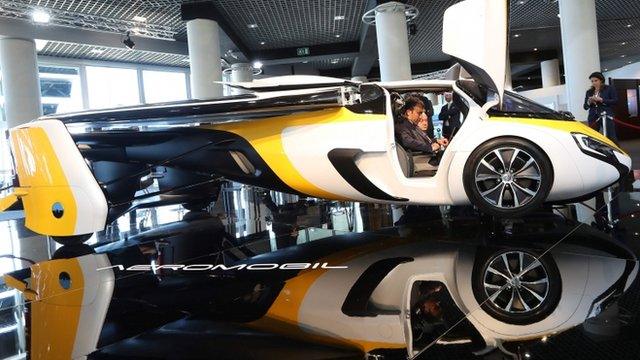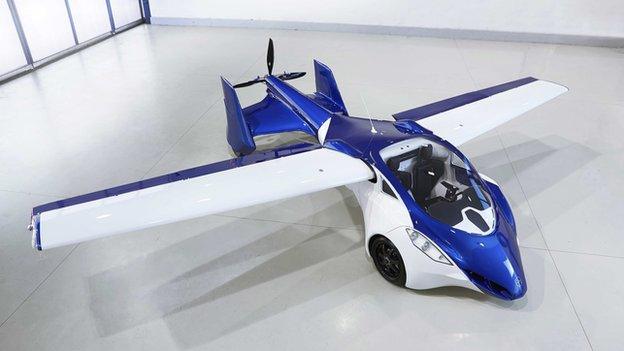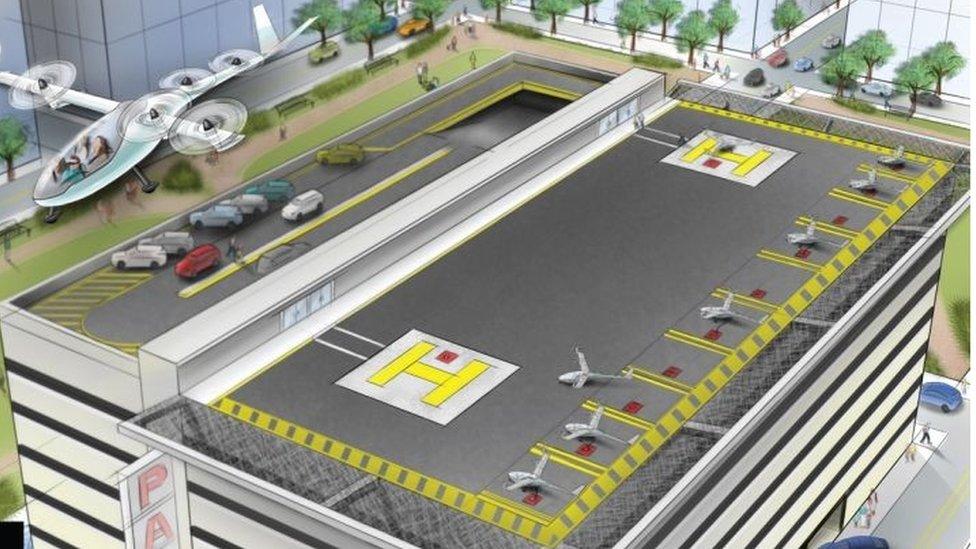Tech Tent - Fake news and flying cars
- Published

Stream or download, external the latest Tech Tent podcast
Listen to previous episodes on the BBC website
Listen live every Friday at 15:00 GMT on the BBC World Service

On Tech Tent this week, we seek answers to two questions obsessing the technology world - can we stem the tide of fake news, and perhaps less seriously, how soon can I go to work in a flying car?

Jimmy Wales hopes to get enough donations to hire a team of journalists
Truth and the Internet
Jimmy Wales has a mission to change the way news works. The founder of Wikipedia has launched something called Wikitribune with the aim of fixing a news landscape he describes as broken. The service will be free but will rely on regular donations to fund the professional journalists who will work alongside volunteer editors.
Now you may think Wikipedia does not have an unblemished record when it comes to accuracy, but Mr Wales tells us that it is actually far more sophisticated than many sites when it comes to fake news - "our community is very sophisticated at recognising misinformation".
But there must be a question over just how attractive Wikitribune will be to readers - and whether they will be willing to fund it. Joshua Benton of the Nieman Journalism Lab is sceptical - he tells us that as well as accurate facts, readers are looking for compelling storytelling, and for all its merits, that is not something you associate with Wikipedia.
The last time I looked at the Wikitribune site it told me that four out of a target of 10 professional journalists had now been funded. It is an attractive idea - but surely one which will have less impact than the changes Google made to its search algorithm this week.
We don't see Google as the primary source of fake news - that's Facebook's domain - but it is certainly where most people go in search of information online. So its move to tweak its algorithm and instruct thousands of people it uses to test its results to be more rigorous in checking out where information comes from, is important.
The fact that a search for "Did the holocaust happen?" led to a holocaust denial site, or that "Is Obama planning a coup?" unearthed a conspiracy theory as top result, showed that the search firm needed to act. The company is confident that it is getting on top of the problem - but knows it is in a constant battle with people trying to game its results for commercial and political ends.

Will flying cars ever really take off?
Ready for take-off?
I blame Peter Thiel. A few years back, the tech billionaire and Donald-Trump-backer mused on what he saw as Silicon Valley's shrunken ambitions - "We wanted flying cars, instead we got 140 characters."
Well, now you can't move for flying cars. This week, we saw Uber boasting that it would launch a fleet of electric flying taxis in Dubai and in Houston, Texas, by 2020. Google founder Larry Page has invested in a start-up which released a video showing a flying jet ski which will apparently allow anyone to speed across a lake for a drink with friends. And a clutch of other ventures, from Airbus to Lilium to e-Volo, are also promising to take us above the traffic in revolutionary new aircraft.
One company Aeromobil showed off its flying car - a light aircraft that can speedily be adapted into a road-going vehicle - at Monaco's Top Marques Show. The company's chief technology officer Doug McAndrew explains that if you are stuck in traffic you will then have to make your way to an airstrip if you want to continue your journey a few thousand metres above the ground.
Now this vehicle is a lot closer to reality than most - if you've got roughly £1m to spare it goes on sale in 2020, and will doubtless appeal to the odd billionaire who's desperate for a novelty to add to the collection of Ferraris and Learjets.
Or perhaps the next big thing in gadgetry will be a personal jetpack. We hear from Richard Browning, who is the closest thing we've seen to a real-life Iron Man. He has been demonstrating a jet-powered flying suit, developed by a British start-up called Gravity, at the Ted conference in Vancouver this week.
But unlike those Californians pushing flying car projects, he is quite down-to-earth about the prospects for his prototype - "we won't be flying down to the supermarket any time soon," he says.
Still, they laughed at Orville and Wilbur Wright - perhaps magnificent men in flying machines will surprise us again one day.
- Published25 April 2017
- Published25 April 2017

- Published30 October 2014

- Published7 February 2017
